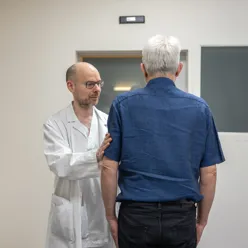Most patients (85-90%) experience a relapsing-remitting (RRMS) course with repeated episodes of CNS-dysfunction, followed by partial or fully remissions. Nevertheless, if not effectively treated, accumulating disability will usually appear along the disease course, and a substantial proportion of the patients will convert to a secondary progressive course (SPMS). The most disabling disease course, primary progressive MS (PPMS), affects about 10-15 % with gradually increasing disability without remission.
Although several genetic and environmental risk factors of MS are identified, the exact pathogenesis of the disease is not yet fully understood. No cure for MS is available, but acute relapses are shortened by courses of high dose methylprednisolone. Increasing numbers of disease-modifying therapies reduce the relapse-frequency and disability progression, most effectively in the early inflammatory phase of the disease. With the development of more effective treatments, the aim of treatment has changed dramatically during the last decades, from simply reducing relapse rates and slowing of disability progression to preventing all evidence of new disease activity.
Early initiation of highly effective therapy may be one way to avoid permanent disability in relapsing MS. Careful risk stratification among the increasing numbers of treatment options, minimize the risk of serious side effects associated to the highly effective drugs. The aim should therefore be that most patients receive the most effective therapy option from onset of the disease.
Tailored symptomatic therapy and rehabilitation to reduce potential disabling symptoms such as spasticity, pain, bladder and bowel dysfunction, depression and improve overall functioning are important as well.
- Optimize or develop new treatment strategies in MS
- Make new therapies early available for Norwegian patients, preferably through participation in randomized clinical trials
- Define and evaluate biomarkers for early diagnoses, disease classification, prognosis and treatment response to offer tailored treatment for the individual patients
Current investigator-initiated clinical trials for MS
- The RAM-MS study: a randomized clinical trial for comparing autologous hematopoietic stem cell transplantation (HSCT) versus alemtuzumab, cladribine or ocrelizumab in MS
- The OVERLORD-MS study: Ocrelizumab Versus Rituximab Off-Label at the Onset of Relapsing MS Disease
- The OR-Switch-MS study: Ocrelizumab to Rituximab Switch Study in Multiple Sclerosis
- The REDUCE-MS study: Rituximab Extended Dose interval in Multiple Sclerosis
- The SMART-MS study: Study of Mesenchymal Autologous stem cells as Regenerative Treatment for Multiple Sclerosis
- The NORSEMAN study: Nicotinamide Riboside Supplementation in Progressive Multiple Sclerosis
- The TAF-MS 1 study: Tenofovir alafenamide fumarate (TAF) and Epstein-Barr virus activity in people with multiple sclerosis
- The TAF-MS 2 study: Tenofovir alafenamide fumarate (TAF) therapy in people with multiple sclerosis
- The NorseMS study: A digital therapeutic to improve insomnia in Multiple Sclerosis – a randomised controlled trial
Current industry-sponsored clinical trials:
- An Extension Study of the Roche P-trials to Investigate Safety and Effectiveness of Ocrelizumab in Participants with Multiple Sclerosis (MS). Sponsor: Roche.
- A Rollover Study to Evaluate the Long-Term Safety and Efficacy of Ocrelizumab in Patients with Multiple Sclerosis (OLERO). Sponsor: Roche.
- A Study to Investigate Long-term Safety and Tolerability of Tolebrutinib in Participants with Multiple Sclerosis. Sponsor: Sanofi.
- Primary Progressive Multiple Sclerosis (PPMS) Study of Bruton's Tyrosine Kinase (BTK) Inhibitor Tolebrutinib (SAR442168) (PERSEUS). Sponsor: Sanofi.
- Non-relapsing Secondary Progressive Multiple Sclerosis (NRSPMS) Study of Bruton's Tyrosine Kinase (BTK) Inhibitor Tolebrutinib (SAR442168) (HERCULES). Sponsor: Sanofi.
- LEMTRADA-PASS Study: A prospective, multicentre, observational, post-authorisation safety study to evaluate the long-term safety profile of LEMTRADA® (alemtuzumab) treatment in patients with relapsing forms of multiple sclerosis. Sponsor: Sanofi.
Completed clinical trials for MS
- The FlowOX-MS study-2: Efficacy of intermittent negative pressure by FlowOX on spasticity in multiple sclerosis
- COVAC-MS study: Humoral response and clinical efficacy of COVID-19 vaccination in multiple sclerosis patients receiving various disease-modifying therapies
See publications from the study:
1. Hospitalisations and humoral COVID-19 vaccine response in vaccinated rituximab-treated multiple sclerosis patients - PubMed
2. Immunogenicity and Safety of a Third SARS-CoV-2 Vaccine Dose in Patients With Multiple Sclerosis and Weak Immune Response After COVID-19 Vaccination - PubMed
3. Humoral immunity to SARS-CoV-2 mRNA vaccination in multiple sclerosis: the relevance of time since last rituximab infusion and first experience from sporadic revaccinations - PubMed - Long-term safety and efficacy of rituximab and cladribine – A tale of two cities
